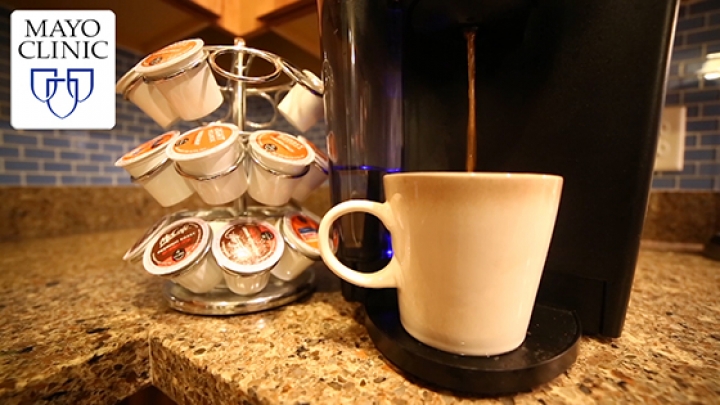(RxWiki News) Do you find yourself drinking several cups of joe each day? How much caffeine is too much?
Caffeine is found in many products, including both drinks and supplements. According to the US Food and Drug Administration (FDA), 400 milligrams a day, which is equivalent to about four cups of coffee, is considered OK for most healthy adults. However, everyone is different, and some may be more sensitive to caffeine than others. Furthermore, the actual caffeine content in drinks and products varies — especially with energy drinks.
That's why it's important for consumers to look at the package and determine how much caffeine is in the product.
A good rule of thumb is as follows:
- 12-ounce soft drink = 30 to 40 mg of caffeine
- 8-ounce green or black tea = 30 to 50 mg of caffeine
- 8 ounces of coffee = 80 to 100 mg of caffeine
- 8-ounce energy drink = 40 to 250 mg of caffeine
If you drink more than four cups of coffee (or equivalent) and are experiencing the following side effects, you may want to consider cutting back:
- Unable to go to sleep or stay asleep
- Jitters
- Feeling anxious
- Fast heart rate
- Upset stomach or nausea
- Headache
Too much caffeine can lead to serious effects. The FDA notes that consuming 1,200 milligrams of caffeine (0.15 tablespoons of pure caffeine) very fast can actually lead to seizures.
Pure caffeine products can be found as dietary supplements and come in powder or liquid forms. These products often come in bulk and require the consumer to measure out their dose, which becomes even more dangerous.
One teaspoon of pure powdered caffeine can have the same amount of caffeine as 28 cups of coffee. A half cup of a highly concentrated caffeine liquid can have the same amount of caffeine as more than 20 cups of coffee.
Also pay attention to caffeine in energy drinks. The amount of caffeine in a serving of each product varies greatly, and some containers have more than one serving.
Some products don’t even specify the amount of caffeine they contain. In fact, according to a recent report that looked at 27 energy drinks, 11 did not specify how much caffeine they contained.
The highest level of caffeine was in 5-Hour Energy Extra Strength — 242 mg of caffeine.
Caffeine is not recommended in children. And caffeine is not a good idea for those who take certain medications, such as theophylline and pseudoephedrine. Women who are pregnant or breastfeeding should speak with their health care provider about limiting their caffeine intake.
Ask your health care provider about the amount of caffeine that is safe for you. If you drink a large amount of caffeine and would like to cut back, withdrawal symptoms can occur if you try to stop suddenly. If you are looking to cut back on caffeine, speak with your health care provider.
Written by Anyssa Garza, PharmD, BCMAS







